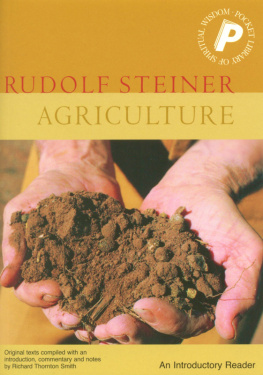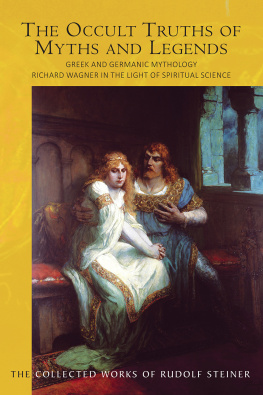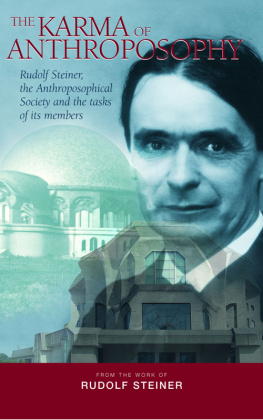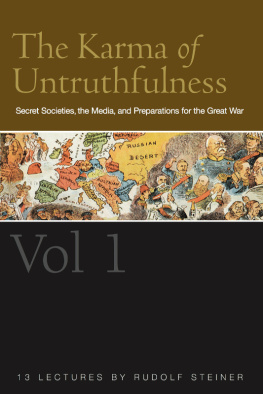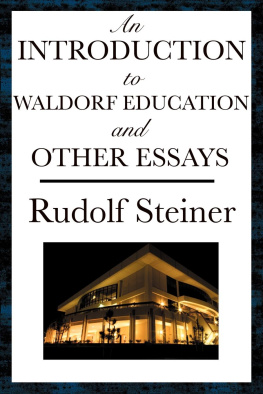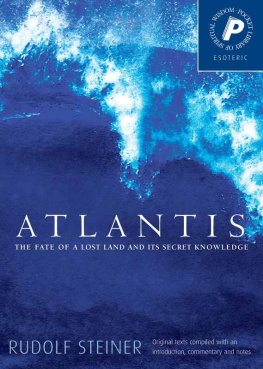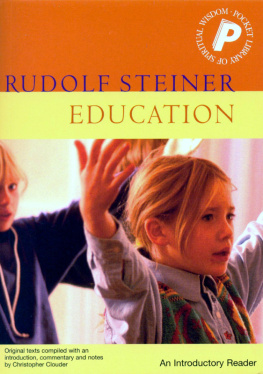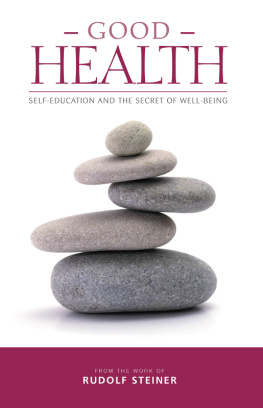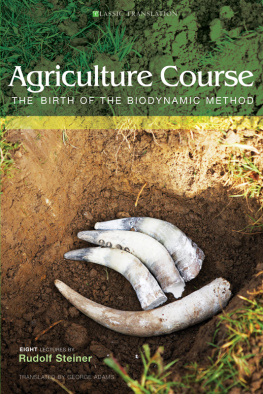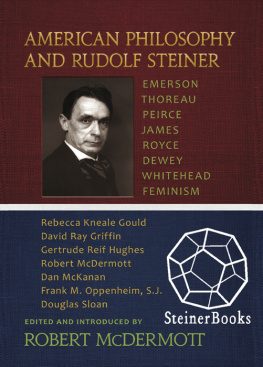Rudolf Steiner - Agriculture: An Introductory Reader
Here you can read online Rudolf Steiner - Agriculture: An Introductory Reader full text of the book (entire story) in english for free. Download pdf and epub, get meaning, cover and reviews about this ebook. year: 2003, publisher: Rudolf Steiner Press, genre: Religion. Description of the work, (preface) as well as reviews are available. Best literature library LitArk.com created for fans of good reading and offers a wide selection of genres:
Romance novel
Science fiction
Adventure
Detective
Science
History
Home and family
Prose
Art
Politics
Computer
Non-fiction
Religion
Business
Children
Humor
Choose a favorite category and find really read worthwhile books. Enjoy immersion in the world of imagination, feel the emotions of the characters or learn something new for yourself, make an fascinating discovery.
- Book:Agriculture: An Introductory Reader
- Author:
- Publisher:Rudolf Steiner Press
- Genre:
- Year:2003
- Rating:5 / 5
- Favourites:Add to favourites
- Your mark:
- 100
- 1
- 2
- 3
- 4
- 5
Agriculture: An Introductory Reader: summary, description and annotation
We offer to read an annotation, description, summary or preface (depends on what the author of the book "Agriculture: An Introductory Reader" wrote himself). If you haven't found the necessary information about the book — write in the comments, we will try to find it.
Rudolf Steiner, the often undervalued, multifaceted genius of modern times, contributed much to the regeneration of culture. In addition to his philosophical teachings, he provided ideas for the development of many practical activities, including education - both general and special - agriculture, medicine, economics, architecture, science, religion and the arts. Today there are thousands of schools, clinics, farms, and many other organizations that are founded directly on his principles.
Agriculture: An Introductory Reader — read online for free the complete book (whole text) full work
Below is the text of the book, divided by pages. System saving the place of the last page read, allows you to conveniently read the book "Agriculture: An Introductory Reader" online for free, without having to search again every time where you left off. Put a bookmark, and you can go to the page where you finished reading at any time.
Font size:
Interval:
Bookmark:

RUDOLF STEINER (18611925) called his spiritual philosophy anthroposophy, meaning wisdom of the human being. As a highly developed seer, he based his work on direct knowledge and perception of spiritual dimensions. He initiated a modern and universal science of spirit, accessible to anyone willing to exercise clear and unprejudiced thinking.
From his spiritual investigations Steiner provided suggestions for the renewal of many activities, including education (both general and special), agriculture, medicine, economics, architecture, science, philosophy, religion and the arts. Today there are thousands of schools, clinics, farms and other organizations involved in practical work based on his principles. His many published works feature his research into the spiritual nature of the human being, the evolution of the world and humanity, and methods of personal development. Steiner wrote some 30 books and delivered over 6000 lectures across Europe. In 1924 he founded the General Anthroposophical Society, which today has branches throughout the world.
Also in this series:
(Practical Applications)
Architecture
Art
Education
Medicine
Religion
Science
Social and Political Science
(Festivals)
Christmas
Easter
Michaelmas
St Johns
Whitsun
(Esoteric)
Alchemy
Atlantis
Christian Rozenkreutz
The Druids
The Goddess
The Holy Grail
RUDOLF STEINER
AGRICULTURE
An Introductory Reader
Compiled with an introduction,
commentary and notes by
Richard Thornton Smith
Sophia Books
All translations revised by Christian von Arnim
Sophia Books
An imprint of Rudolf Steiner Press
Hillside House, The Square
Forest Row, RH18 5ES
www.rudolfsteinerpress.com
Published by Rudolf Steiner Press 2012
For earlier English publications of individual selections please
see Sources
The material by Rudolf Steiner was originally published in
German in various volumes of the GA (Rudolf Steiner
Gesamtausgabe or Collected Works) by Rudolf Steiner Verlag,
Dornach. This authorized volume is published by permission of
the Rudolf Steiner Nachlassverwaltung, Dornach (for further
information see Note Regarding Rudolf Steiners Lectures)
This selection and translation Rudolf Steiner Press 2003
All rights reserved. No part of this publication may be
reproduced, stored in a retrieval system, or transmitted, in any
form or by any means, electronic, mechanical, photocopying
or otherwise, without the prior permission of the publishers
A catalogue record for this book is available from the British
Library
ISBN 978 1 85584 329 5
Cover by Andrew Morgan Design
Typeset by DP Photosetting, Aylesbury, Bucks.
Contents
Introduction
by Richard Thornton Smith
Introduction
by Richard Thornton Smith
The current context of agriculture
Most of us would probably agree that the mission of agriculture is to feed humanity. This book of extracts from Rudolf Steiners works explores the breadth and depth of meaning in this statement. But before offering an outline of the book it is necessary to make a few observations about people and agriculture so as to place the material in a truly modern context.
Agriculture was once a way of life connecting human beings with the earth and her rhythms, but this relationship has been progressively eroded by an urbanizing world driven by commercial imperatives. It is true that mechanization has emancipated us from the toils inflicted on Adam, while the starvation visualized by Malthus has up to now been localized and linked to conflict and poverty as much as environment. On the other hand, societyWestern society in particularhas massive social and mental health problems. The latter may well be partly linked to the nutritional quality of our food, now heavily compromised by farming and food processing methods. Many problems can be seen as resulting from the dominance of economic forces over other aspects of human life. In agriculture we see the human consequences both of driving down food prices and of advancing technology and chemicals. The current health and safety risks in agriculture together with the terrible consequences of bankruptcy now make farming one of the highest-risk occupations in the world.
In this modern world all human activities are driven by and subordinated to economic processes, whether local or global. The environmental and social consequences of this are now outstandingly obvious in developed and developing countries alike.
Farming is part of the culture of every land and it has been fundamental to civilization in providing the foundation from which a variety of economic activities have developed. As the world becomes ever more dependent upon non-agricultural work, it becomes increasingly important to realize this. Such an urban orientation has already shaped the public and political attitude to agriculture. Instead of being able to follow its own rules dictated by natural processes and local markets, agriculture has become a slave to a distant majority who have little knowledge of its inner workings and who find it natural to regard a farm as being like any other production system. It is sobering to reflect that as world population increases, total food production is in the hands of a dwindling number of farm workers whose daily tasks and financial rewards would be considered unacceptable by the majority. It is even claimed that young people today are no longer capable of the physical work required.
In recent years the public have been faced with a variety of scares ranging from the pesticide content of vegetables to the consequences of feeding cattle with animal waste products. These events are welcome in the sense that they have provided a wake-up call. The recent period of chemical agriculture and food processing has seen unprecedented increases in the incidence of certain diseases and it may yet have such an influence upon human fertility that no other population control measure will have been as successful. Increased awareness has been a turning-point in food budgeting for many people, yet the current low food price culture and the seductive influence of junk foods is a huge obstacle to a healthier society. The food industry together with the majority of consumers consider that the way we produce our food doesnt matter, that carbohydrate or protein is the same however it is produced or reconstituted. At a time when health service provision is constantly in the spotlight it might seem difficult to comprehend why there are no hard-hitting national initiatives to build positive health through diet and nutrition. Were the truth to be known, understood and adequately researched, the situation could be so different. As it is, even those inclining towards organic produce do so for reasons which are mostly peripheral to an understanding of its real health benefits.
Background to the present volume
This clearly identifies an objective towards which a deeper knowledge of agriculture and human needs should be directed. It is no use blaming a system that is profoundly ignorant of the human being and our connection with the wide realms of nature. The rebuilding of a knowledge that people once had, but transformed through the modern intellect and expressed through our independent lifestyles, will in the future enable us to change the marketplace and to refashion the world. Rudolf Steiner devoted his lifes energies to further our spiritual understanding of the human being, and his work is alive with relevance to the situation we face at the present time. He addressed himself to the many subjects with a bearing on natural science or agriculture, however remote some of these topics might appear. Indeed, in his agriculture lectures we read that there is scarcely a realm of human life which lies outside our subject. Throughout the preparation of this book I have had in mind Steiners reply to a question put to him by Ehrenfried Pfeiffer concerning peoples lack of will and progress with spiritual activities despite his stimulus and guidance. Steiner answered, This is a problem of nutrition. Nutrition as it is today does not supply the strength necessary for manifesting the spirit in physical life. A bridge can no longer be built from thinking to will and action. Food plants no longer contain the forces people need for this.
Next pageFont size:
Interval:
Bookmark:
Similar books «Agriculture: An Introductory Reader»
Look at similar books to Agriculture: An Introductory Reader. We have selected literature similar in name and meaning in the hope of providing readers with more options to find new, interesting, not yet read works.
Discussion, reviews of the book Agriculture: An Introductory Reader and just readers' own opinions. Leave your comments, write what you think about the work, its meaning or the main characters. Specify what exactly you liked and what you didn't like, and why you think so.

